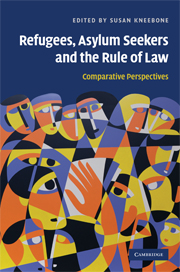Book contents
- Frontmatter
- Contents
- Contributors
- Foreword
- Preface
- Introduction: Refugees and Asylum Seekers in the International Context – Rights and Realities
- 1 The Rule of Law and the Role of Law: Refugees and Asylum Seekers
- 2 Asylum and the Rule of Law in Canada: Hearing the Other (Side)
- 3 Refugees, Asylum and the Rule of Law in the USA
- 4 The Australian Story: Asylum Seekers outside the Law
- 5 The Intersection between the International, the Regional and the Domestic: Seeking Asylum in the UK
- 6 Conclusions on the Rule of Law
- Appendix
- Bibliography
- Index
1 - The Rule of Law and the Role of Law: Refugees and Asylum Seekers
Published online by Cambridge University Press: 10 December 2009
- Frontmatter
- Contents
- Contributors
- Foreword
- Preface
- Introduction: Refugees and Asylum Seekers in the International Context – Rights and Realities
- 1 The Rule of Law and the Role of Law: Refugees and Asylum Seekers
- 2 Asylum and the Rule of Law in Canada: Hearing the Other (Side)
- 3 Refugees, Asylum and the Rule of Law in the USA
- 4 The Australian Story: Asylum Seekers outside the Law
- 5 The Intersection between the International, the Regional and the Domestic: Seeking Asylum in the UK
- 6 Conclusions on the Rule of Law
- Appendix
- Bibliography
- Index
Summary
The purpose of this chapter is to explain some meanings of the rule of law, and how they fit with ideas about the operation of a legal system comprising three independent arms of government. This will assist with an evaluation of the role of law in this contested area of refugee and asylum law and policy. In particular, this chapter introduces the reader to Ronald Dworkin's idea of ‘law as integrity’ as one tool in such an evaluation.
The focus of this book upon the rule of law arises from an overall concern with how national legal responses to refugees and asylum seekers have developed, and what they reveal about the operation of the rule of law. The way that the rule of law operates at the national level in relation to refugees and asylum seekers determines the extent to which their rights in international law (especially, as explained in the previous chapter, the right to seek asylum and the right against refoulement) are respected. That is, it is important for practical reasons, as it has been left to state parties to international treaties to acknowledge and to implement the rights and status of asylum seekers and refugees. As explained in the previous chapter, the international rule of law is imperfect, and it is open to individual states to interpret and implement it according to their own needs and understanding. This book is concerned about the integrity or coherency of ‘dualist’ legal systems.
- Type
- Chapter
- Information
- Refugees, Asylum Seekers and the Rule of LawComparative Perspectives, pp. 32 - 77Publisher: Cambridge University PressPrint publication year: 2009
- 2
- Cited by



